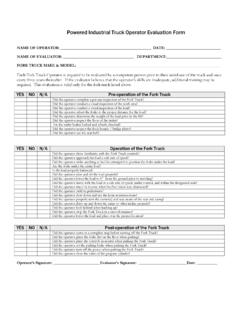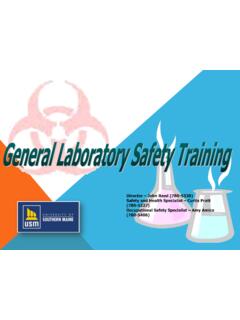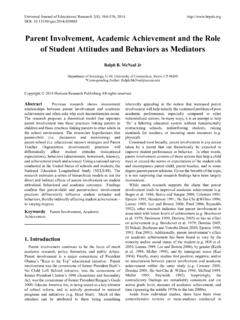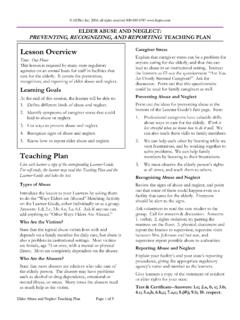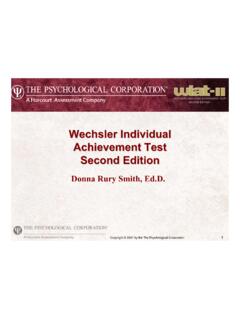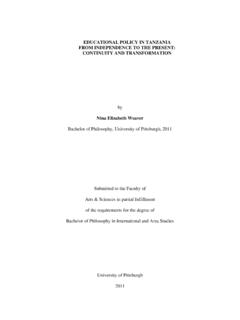Transcription of Effective Strategies for Engaging Parents in Students ...
1 Effective Strategies for Engaging Parents in Students Learning to Support achievement Prepared by: Katie M. Thompson, , Theresa J. Gillis, Janet Fairman, Craig A. Mason, March 2014 Maine Education Policy Research Institute College of Education and Human Development University of Maine Orono, Maine Effective Strategies for Engaging Parents in Students Learning to Support achievement March 2014 Katie M. Thompson, , Theresa J. Gillis, Janet Fairman, Associate Research Professor Craig A. Mason, Professor of Education and Applied Quantitative Methods Maine Education Policy Research Institute A nonpartisan research institute funded by the Maine State Legislature, the University of Maine, and the University of Southern Maine.
2 Center for Research and Evaluation College of Education and Human Development University of Maine, 5766 Shibles Hall, Orono, Maine 04469-5766 (207) 581-2475 A Member of the University of Maine System i AUTHOR S BIOGRAPHICAL INFORMATION Craig A. Mason, , is a Professor of Education and Applied Quantitative Methods at the University of Maine, where he also serves as the Director of the Center for Research and Evaluation and Co-Director of the Maine Education Policy Research Institute. For the past decade, Dr. Mason has also served as a methodological consultant to the Centers for Disease Control and Prevention. Dr. Mason received his PhD in Clinical Child Psychology from the University of Washington, and his research interests are in developmental growth models, parent-child relationships, informatics, and research methods.
3 He has over 80 publications, and has been principal investigator or co-principal investigator on over $10 million in grants. Janet Fairman, , is an Associate Professor of Education at the University of Maine based in the Center for Research and Evaluation in the College of Education and Human Development. Dr. Fairman received her from Rutgers University, where she studied education policy. Her research interests are policy analysis and educational leadership, with a particular interest in qualitative methodology. Recent projects include a randomized control trial examining the efficacy of an online, computerized math homework system, and a study of school consolidation efforts in Maine. In addition to her research work, Dr. Fairman teaches courses on research methodology, qualitative research designs, and program evaluation.
4 Theresa J. Gillis, , is enrolled in the Educational Leadership doctoral cohort at the University of Maine. She also works full-time as the principal of Turner Primary School in Turner, Maine, and as the mother of two children. Her research interests include leadership as it relates to student achievement , early social skill development in children and Strategies for increasing student success. Katie M. Thompson, , , is currently working toward her in the Educational Leadership cohort at the University of Maine. She is also a full time science teacher and varsity field hockey coach at Nokomis Regional High in Newport, Maine. Her research interests include group culture as it is influenced by leaders in student and teacher teams and teacher efficacy in teaching engineering in STEM education.
5 Ii EXECUTIVE SUMMARY The purpose of this report is three-fold. First, it reviews the research literature on parental engagement in schooling as a means for increasing student learning and achievement . Second, the study assesses and reviews parent engagement Strategies used in a sample of Maine schools. Finally, the study conducts exploratory analyses examining whether higher levels of parental engagement in schools in Maine is related to higher levels of student proficiency on state standardized achievement tests. To accomplish this, the research team conducted a review of the research literature on parent engagement and its impact on student achievement and learning. This review examined parental engagement in school settings ( , volunteering), as well as parental engagement in their child s learning at home ( , helping on homework).
6 Based on the literature and national best practice standards, the team conducted an online survey of school principals in Maine, in order to assess the various parental engagement Strategies being used across the state (referred to here as the School Engagement Survey ). These data were then linked to state assessment data in order to identify possible relationships between school reports of parental engagement activities and student proficiency in math and reading. Research Evidence. While empirically strong research on the effect of parent engagement in school is limited, studies suggest that parent engagement in their son or daughter s learning at home has consistently greater impacts on his or her academic achievement and performance than does parent engagement in the school setting itself (Sheldon and Epstein, 2005; Harris and Goodall,2008; Altschul, 2011).
7 In particular, collaborative homework that requires Parents and children to work together, and providing enrichment materials that Students can take home to their families have been found to be Effective . In contrast, while all agree parent engagement in their child s school is positive, there is less evidence that it results in improved student learning and achievement (Altschul, 2011; Harris and Goodall, 2008; DePlanty, Coulter-Kern, and Duchane, 2007). Research does suggest that specific approaches that are targeted in terms of their audience and content, proactive, and direct, may have larger impacts on student learning and performance than approaches that are more general and indirect. Furthermore, researchers iii have noted that the effect of parental involvement in schools may vary based on the age of the child and the nature of the involvement.
8 With young children, having a parent visibly involved in their classroom may be beneficial; whereas, for adolescents, less visible involvement such as serving on school committees may be more important (Singh et al., 1995). Parental Engagement in Maine Schools. A survey of 48 schools across Maine suggested that schools were generally active in attempting to both engage Parents in the school as well as support collaborative parent-child learning activities at home. Nearly two-thirds of these schools reported making special efforts to assign parent-child collaborative homework and half made special efforts to provide families with enrichment material for at-home use. Nearly all schools made efforts to engage Parents of new Students and many held regular workshops on topics such as testing and student placements.
9 In addition, nearly two-thirds of these schools reported that their school administration and PTA worked well or very well together. Relationship with Proficiency in Math and Reading. When interpreting possible relationships between school reports of parent engagement activities and student testing data, it must be remembered that these are cross-sectional snapshots of school programs and proficiency rates. One cannot draw casual inferences that a parent engagement strategy resulted in improved proficiency in math or reading. Recognizing that limitation, analyses using state testing data suggested that a number of parent-engagement efforts being used in Maine were related to student academic outcomes, in particular proficiency in math, and to a lesser degree proficiency in reading.
10 For example, when examining data from all 48 schools, those that that sent new families a personalized welcome letter, made special effort to provide families with enrichment material at home, and made special effort to inform Parents of school testing periods, had higher rates of proficiency in math than schools that did not make such efforts. Furthermore, schools that reported their administration and PTA work well together and those that reported sending Parents Welcome packets to Parents of new Students also had higher school-wide rates of proficiency in both math and reading. Reflecting the previous observation that certain parent engagement Strategies may be more Effective for younger Students , several engagement Strategies were related to student proficiency in math for elementary and middle schools, but not for high school.




